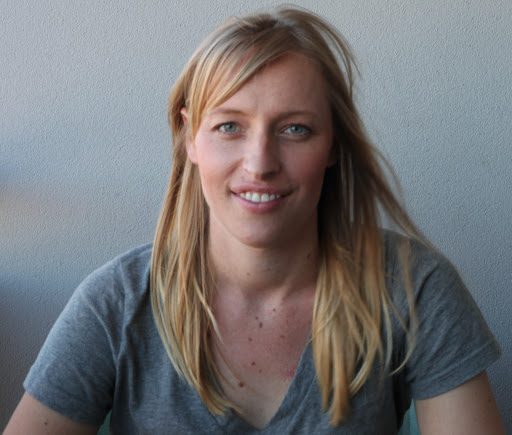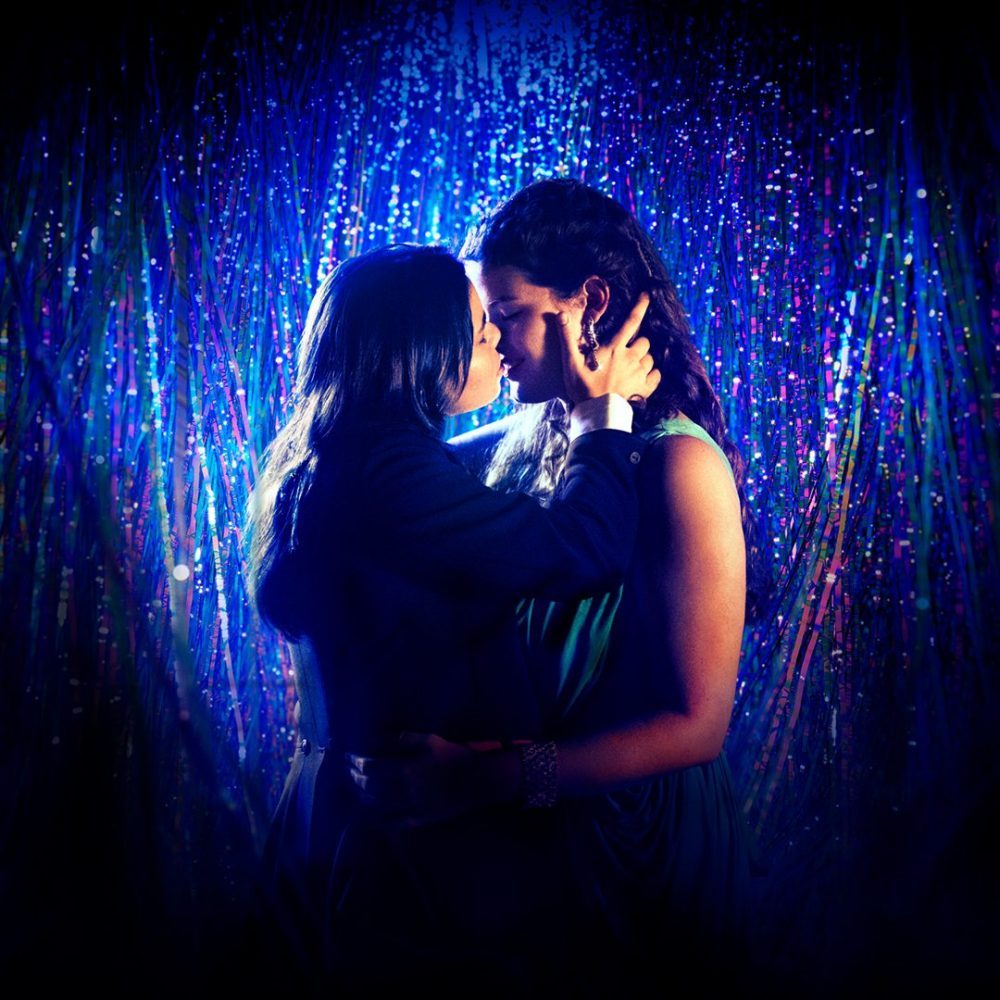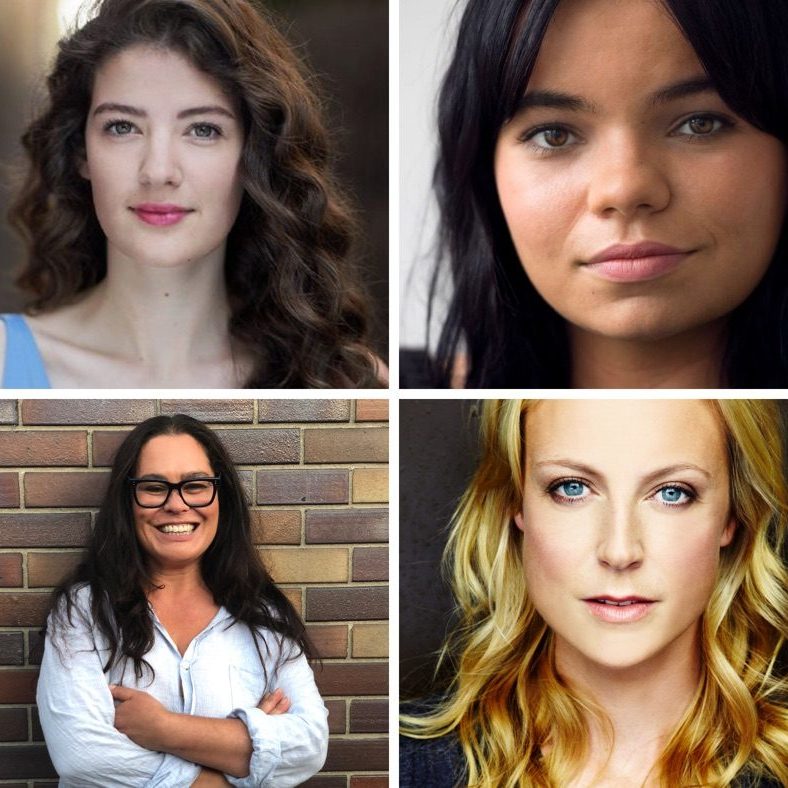
Monica Zanetti is an award-winning Australian Screenwriter & Director.
Monica wrote and directed ELLIE & ABBIE (& ELLIE’S DEAD AUNT) which opened the 2020 Mardi Gras Film Festival; the first Australian film to do so in the history of the festival.
I want to acknowledge that we’re speaking on the lands of the Gadigal people of the Eora nation, and would also like to acknowledge the elders past and present. Sovereignty was never ceded. It always was and always will be Aboriginal land.
We caught up with Monica
So, I would love it if you could give me a super quick rundown of the film, in your own words.
Basically, it’s a high school rom-com, about two teenage girls, Ellie and Abbie. Ellie has recently realized that she’s gay and has a crush on Abbie, who is her classmate. And she wants to ask her to the formal. But before she gets a chance to do that her aunt, who was a lesbian in the 80s, who died before she was born, shows up as a fairy godmother-type to basically help guide her, whether she wants it or not.
That’s awesome. I love the phrase fairy godmother. That entire joke is so great, sort of low hanging fruit, right?
It’s so easy. [laughs] But it’s so fun.
Not only is the film just the cutest rom-com, but it also touches on some significant parts of Australian queer history. Am I right in thinking it’s the Fred Nile march?
Yeah. The Fred Nile cleansing march.
I think it’s really cool that it touches on that because you hear so much about Stonewall and other movements that are very intrinsic to queer history but are not really applicable to Australian queer history. So, was it super important to you to bring that element of history into it?
Yes, it was. It was important for a couple of reasons. One of the main points in the film that I really wanted to express was the fact that Ellie has this modern love story that is simple in comparison to what her aunt went through.
And she can only have that love story now. The same way that I can only have my seemingly quite simple queer existence because of people who didn’t have that experience, because they had to fight for that. So, it was very important to acknowledge the fact that this modern love story can now exist because not that long ago, it couldn’t. And so, that was one part. The reason I chose that particular rally, the Fred Nile one, is because I wanted to talk about something different.
We do hear a lot about Mardi Gras, and Stonewall, which was all incredibly important, but there’s just so many other movements and so many other moments. And so, I just wanted to talk about something that didn’t necessarily get talked about as much. And there’s a line in the film where Ellie’s mom says “if you want these stories, you have to go looking for them.” And I had to go looking for them. It was very hard to find any information.
I think I found one article and one YouTube video, which we used in the credits. So, yeah, there’s not a lot out there. It’s a really good one to look at, Fred Nile is still in politics. He’s still around. And it seems so crazy that that would happen. But he is very much still in politics and still very much has those beliefs. Those little things of being like, “oh, we’ve changed so much.” But also, those people still very much exist.
There’s something wonderful there about embracing the difference of queerness. And that our history is what creates that difference? I really feel like even by just being able to do this interview about you, we’re all standing on the shoulders of giants in these freedoms we have today.
Yeah. And I think particularly in my generation (the millennial generation), as more and more gay people start to be accepted, there seems to be this big theme of fitting in the most inoffensive way. Show them that you’re just like them.
We should be able to get married too because we’re just like you. And while I obviously think marriage equality is incredibly important, it was this thing of thinking the aim was to get into a relationship that was long-term that could look like heterosexual relationships. And that was something that I think had to be quite destructive because it does create this sense of being that the safest way to be is to be just like everyone else so that you don’t stand out, you don’t make noise, and you don’t offend anyone.
Be the straightest queer you can be.
Be the straightest queer you can be. And particularly in my generation, I see it a lot. And obviously, whatever makes you happy is really important. And whatever gets you through, and however you survive is very important. I guess that’s why I wanted to include this whole thing of like, being different, it’s okay to say, actually, I’m gay, and I am different. I’m not like you. And it’s really wonderful if you can get to a stage where you can embrace that.
And I understand that not everyone can, it’s not a choice that everyone has. But it was a big lesson for me. That’s something that I’ve only kind of really grappled with in the last couple of years. And I think too when you do come out, you can come out to very supportive friends. And one of the ways that I think they feel is the right way to support you is to say, you’re exactly the same. You’re exactly the same as me. I don’t see you any different.
And again, that’s a lovely sentiment that I sometimes think there are things underneath that it’s okay. And we’re all starting to look at things differently and learn things differently. But I also think it’s okay to be like you’re different and that’s wonderful. And I still love you. And that’s great. Depending on what the person needs. It’s definitely something that I personally have very much grappled with. So, I am very proud that it’s in there and that people seem to be responding to that.
You should be proud! That’s incredibly powerful. So, going off that, fortunately, the world has changed for the most part, in a lot of good ways. However, homophobia is still happening all the time, and very constantly. But it is happening in those more discreet casual ways. I loved Abbie’s coming out story and how being out affected the people she thought cared about her and made them act slightly different. And I remember Zoe [Terakes] speaking at the film festival [that I attended in Feb], and saying that those actions ‘create tiny scars that you don’t recognize until you’re older.’ Was addressing this important to you?
Yes. I think what I found really interesting in this was these kinds of micro-moments that people don’t realize that they’re doing. And I mean, the line that sticks with a lot of people is when Ellie talks about her mum and says, ‘she hasn’t teased me about her.
If I was dating a guy, she would tease me those things, I’m dating a girl, she doesn’t know how to react.’ And I think that is a very common experience, it seems to really hit the nail on the head. It has made people think and think if they’re being the most supportive person that they can be. There are these little moments that they kind of be like, “oh, shit, I do that.” So, I do like that it seems to be getting people talking about that stuff. And that people seem to recognize it.
And then also, I think, for the queer people on the receiving end, it’s one of those things that you might not always realise that, again, that you can come away from interaction and be like, that’s so quite painful, and I don’t know why. I think being able to recognise these things can help change behaviours and monitor how we speak about things and makes us a bit more careful about things without thinking about how it might make people feel on the other end.
Sort of creates a bit of empathy there.
I think so too. Yeah.
How valuable would this film have been when you were growing up?
Oh, very valuable. Very, very valuable. I think I probably would have gotten there a bit quicker if I’d seen it represented in a way that wasn’t… the content for my generation, in particular, I think there’s definitely some much better stuff out there now.
But for my generation, it was either all over-sexualized, and that felt quite terrifying to me as a young person. It was connected to killing someone or being killed. Or being in a terrifying girl group where you have to sleep with the leader to get it.
All of it was terrifying. And it didn’t look like me. So, I was like, well, I don’t want to murder anyone. I also don’t want to take a lot of drugs. So, that’s also not me. So, that’s obviously a wild lifestyle. There was really nothing there. And then I remember the first real representation that I remember was Tara and Willow. But then that also didn’t look like me. That’s also not my life. Because I’m not spiritual, I’m not into witchcraft.
You don’t have a friend who’s a vampire
[laughs] I don’t have a friend who was a vampire. And I wanted to be Buffy! So, it was all very confusing. The one shows that I do remember growing up, which I think is probably the closest I got and the closest I came to be like, oh that is me, was a British teenage show called Sugar Rush.
It was just about this girl who’s in love with her friend. It was wonderful. It was such a great show and so progressive. But then I’ve never seen anything like it since. It was kind of like was this standalone thing, but I think when for a few seasons, and then it didn’t lead to companies and people being like, oh, let’s make more stuff like this. It’s kinda like, okay, we should rush the end. But I have been thinking a lot about Sugar Rush lately, cause I’m like, people should find it and revisit it. I think it was quite good. But yes, this film would have been great for me.
We are seeing more queer stories with happy endings than ever now, thank goodness. It was really getting dark there for a second. Do you think that it’s important that we keep giving queer characters happy endings?
Yeah, I do. I think there are all kinds of stories and all that need to be told. But I think the ones with happy endings are a very important part of that. Because there are a lot of happy endings. That’s the thing. There is a lot of happiness in our community and a lot of joy and a lot of love.
And I think that’s just really important to talk about as well. And often it does go hand in hand with pain. And there are things that we experience in our community that you don’t experience outside the community. But the more joy that people can see, the more they will feel like there is a joy for them. And there is hope, and they can aspire to that.
Absolutely. You said something really interesting at the film festival. Something like the reason why you didn’t just make a happy story was that you couldn’t get to just a happy story without acknowledging the history of it…
Without acknowledging where that happiness came from. Yeah. And I couldn’t. I was grinding it, and it just seems quite short-sighted. And I always knew that that part was going to be in it. I always knew there was going to be the dead aunt character. I didn’t necessarily know how deep I was going to go into it. But I definitely knew that those two things were very connected.
Can you think of a bit of advice that comes from the heart and soul of the film that you would tell a young queer person who’s struggling with who they are?
That is very good. I think that happy endings are so possible, and you will get a happy ending. And even if it doesn’t feel like it now, or even doesn’t feel like it in the next few weeks, depending on where you are, you will get there, and you will find your people, and you will find your happiness. And that is, I think for everyone. Well, that is my hope for everyone.


